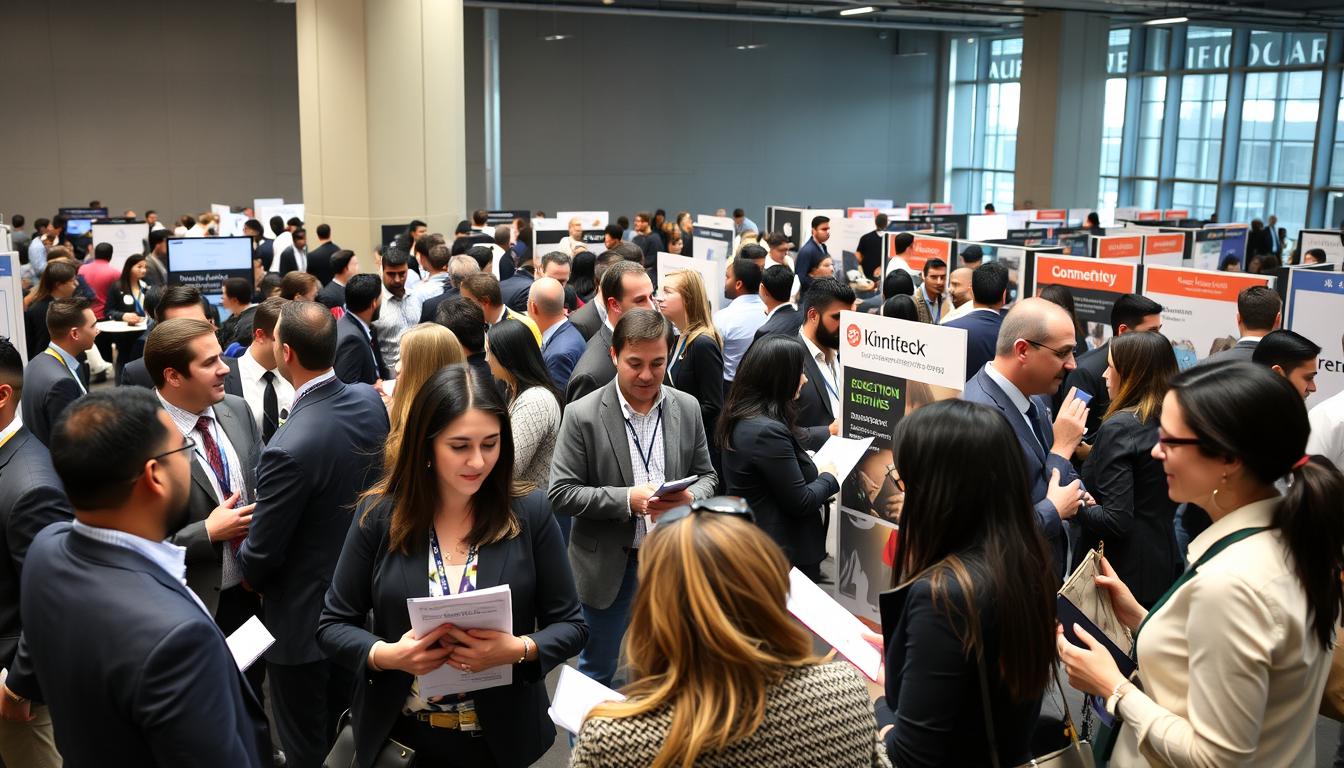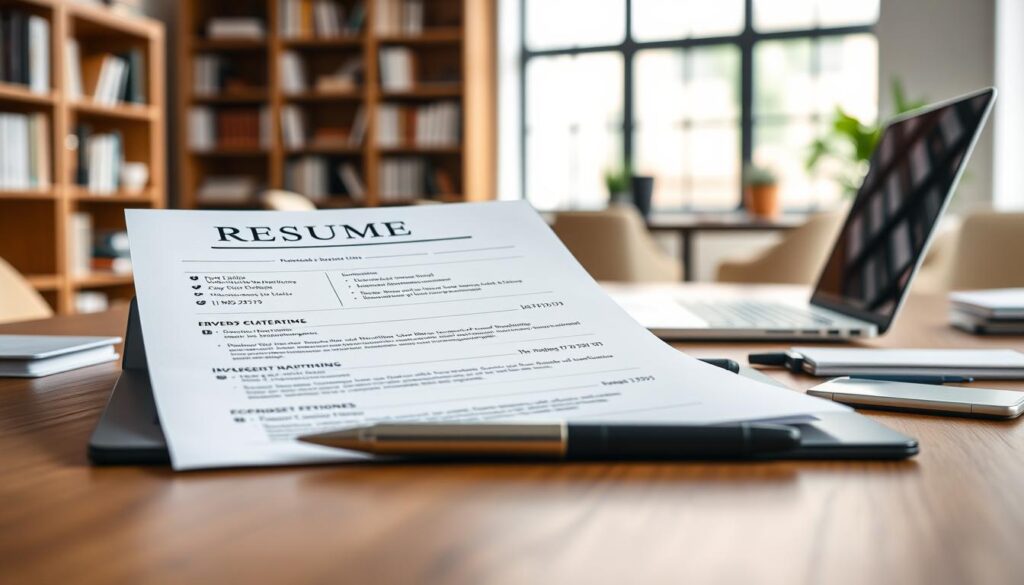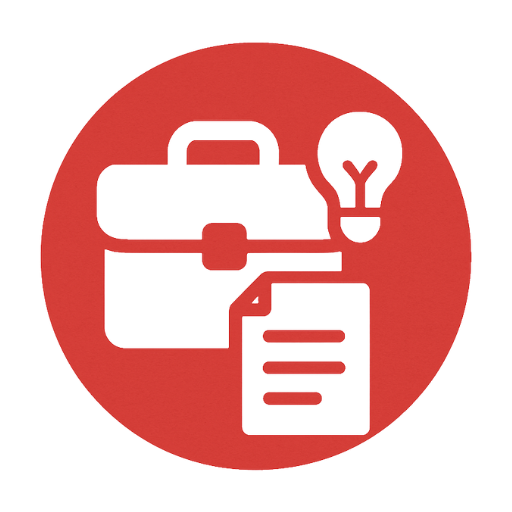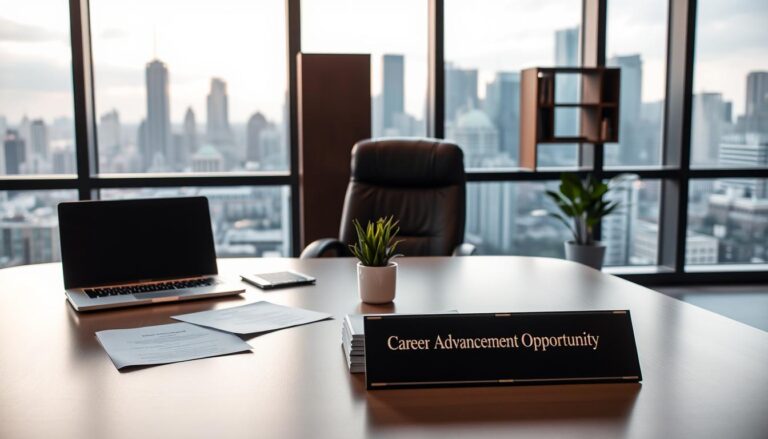How to Make the Most of a Job Fair

Job fairs are a great chance to check out different careers, meet professionals, and find new opportunities. They can help you land your first job or move up in your career.
Going to a job fair is a big step in your career development. It lets you talk to employers, learn about new trends, and understand the job market better.
Knowing how to network and being ready can make your job fair experience better. This way, you can reach your career goals.
This article will guide you on how to make the most of a job fair. We’ll share important tips and the advantages of attending these events.
Understanding the Value of Job Fairs in Your Career Search
Job fairs are a great way to meet potential employers. They are key in the job hunt, letting people check out different careers and meet industry experts.
The value of job fairs is in bringing employers and job seekers together. This face-to-face time can lead to real connections and job chances.
In-Person Career Fairs
In-person career fairs give a real experience. You can talk to company reps, learn about their culture, and even get interviewed on the spot. Career and Professional Development hosts events each spring for students and alumni to meet employers.
Virtual job fairs offer a flexible option. They let you connect with employers from anywhere. This is good for those who can’t go to in-person events.
Using both in-person and virtual job fairs helps job seekers. They get to see many job chances and learn about different industries. This helps shape their career plans.
Pre-Fair Preparation: Setting Yourself Up for Success
Before you go to a job fair, getting ready is crucial for your career. Pre-fair preparation includes several key steps. These steps can greatly improve your experience and results.
First, set quantifiable objectives. This means deciding what you want to get out of the job fair. Do you want to meet a certain number of employers? Or maybe get a few interviews? Having clear goals helps you stay focused.
Quantifiable Objectives
To set quantifiable objectives, think about what you want to achieve. For instance, you might aim to get a certain number of business cards or set up a few follow-up meetings. Write down your goals and check them before the job fair to stay on track.
Prioritizing Your Time
Good time management is key at a job fair. With many employers and lots of people, it’s easy to get lost. Plan your visit by focusing on your top-choice employers. Look up the employers and their booth locations to use your time wisely.
It’s also important to research employers before the job fair. Check their websites and social media to learn about their projects, culture, and jobs. This way, you can ask smart questions and show you’re really interested.
Make a list of questions for each employer. Ask about their hiring process, values, or upcoming projects. Being ready with good questions impresses recruiters and helps you learn a lot.
By setting clear goals, managing your time well, and researching employers, you’ll get the most out of the job fair. These steps help you connect with employers and move closer to your career dreams.
Crafting Your Professional Materials
To make a lasting impression at a job fair, your professional materials must be top-notch. This includes having a well-crafted resume that highlights your skills and experience.
Your resume is often the first point of contact with potential employers. It’s crucial that it’s updated and tailored to the industry you’re applying to. Resume tips can help you stand out from the competition.
Industry-Specific Resume Tips
Tailoring your resume to the specific industry you’re applying to can significantly improve your chances. For instance, if you’re applying to the tech industry, highlighting your coding skills and any relevant projects you’ve worked on can be beneficial. Use language from the job posting to describe your skills and experience.

When it comes to distributing your resume, there’s a delicate balance between quantity vs. quality. While it’s tempting to hand out as many resumes as possible, focusing on quality interactions is more effective. Ensure that you’re targeting the right employers and that your resume is personalized for each application.
It’s also a good idea to bring multiple copies of your resume to the job fair, as well as considering digital formats. Including a QR code on your resume that links to your online portfolio or LinkedIn profile can be a modern and efficient way to share your professional presence.
By focusing on crafting high-quality professional materials and being strategic about their distribution, you can maximize your impact at a job fair. This will take a significant step towards achieving your career goals.
Dressing and Presenting Yourself Professionally
At a job fair, how you look matters a lot. Dressing professionally shows you’re serious about the event.
To make a strong first impression, wear business casual or formal clothes. Keep your hair neat and avoid too much jewelry. It should not draw attention away from your professional look.
Making a Strong First Impression
Looking well-groomed and dressed professionally boosts your confidence. It helps you make a good impression on recruiters. This first impression can lead to better conversations.
Maintaining Energy Throughout the Day
Energy management is key at a job fair. It can be long and tiring. Get enough sleep, drink water, and take breaks to stay energetic and enthusiastic.
By paying attention to your appearance and energy, you can impress potential employers. This increases your chances of success at the job fair.
How to Make the Most of a Job Fair During the Event
Job fairs can feel overwhelming, but with the right plan, you can make great connections. Being prepared and flexible is key to a good experience.
Before you start, make a list of employers you want to meet. Look up their booths and plan your visits. But, also keep an open mind for other interesting employers you might find. This way, you’ll get the most out of your time.
Balancing Popular and Less-Crowded Booths
It’s easy to rush to the most popular booths, but this can lead to long waits or shallow talks. Try visiting less-crowded booths first for deeper conversations. Then, hit the popular ones with shorter lines and more focused chats.
Many job fairs have workshops and presentations that offer insights into industries and companies. These sessions are not just informative but also great for networking in a relaxed setting. Check the event schedule and aim to attend sessions that interest you.
Effective job fair strategies include being prepared, flexible, and proactive. By balancing your visits and using workshops, you can greatly improve your job fair experience.
Mastering Conversations with Recruiters
Talking well with recruiters is crucial at job fairs. Being ready for these chats can open doors to interviews.
Practice your elevator pitch to introduce yourself confidently. It should be short, about 30 seconds, and show off your skills and experiences.

Recruiters ask various questions, from simple to specific about the job. Be ready to answer common ones like “What are your strengths and weaknesses?” or “Why do you want to work for our company?”
Strategies for Brief Yet Impactful Responses
To answer well, keep it brevity and relevance. Use the STAR method (Situation, Task, Action, Result) to share your achievements and skills briefly.
Also, have questions ready about the company or the job. This shows you’re interested and makes a good impression.
Being present in conversations is key. Keep eye contact, nod to show you’re listening, and don’t interrupt. These actions can make your interaction better.
Mastering conversations with recruiters can greatly improve your job fair experience. It boosts your chances of success.
Networking Beyond Recruiters
Meeting recruiters at job fairs is important, but don’t stop there. Expanding your network can really boost your career. Job fairs are a chance to meet not just employers, but also other professionals and future colleagues.
Expanding Your Network at a job fair means being active. Attend seminars, join workshops, or just chat with others. Aim for a diverse network that offers support, advice, and new chances.
After meeting new people, connect with them on LinkedIn. Create a professional LinkedIn profile if you don’t have one. Then, send them personalized connection requests. This keeps the conversation going and opens doors to more opportunities.
Following Company Social Media Accounts
Stay in touch with companies you met by following their social media. This way, you’ll know about their news, products, or job openings. By commenting or sharing their posts, you can also stay on their radar.
Using these strategies, you can make the most of job fairs. What might seem like a brief meeting can become a lasting professional connection.
Post-Fair Follow-Up Strategies
Effective follow-up strategies can make a big difference. After meeting employers at a job fair, it’s key to keep the momentum going. This means following up in the right way.
Sending a thank-you email to each employer you met within 24 hours is highly recommended. In this email, mention meeting at the fair, talk about what you discussed, and attach your resume. This shows you’re professional and still interested in the job.
Choosing between email and handwritten notes depends on what you prefer. Email is usually better for its quickness, reaching employers fast. But, a handwritten note can be special if you really connected.
Timing Your Follow-Up Communications
The timing of your follow-up is very important. Aim to send your email or note within 24 hours of the job fair. This keeps you on their mind. For jobs needing more interviews, a follow-up email a week or two later is okay, if they haven’t contacted you yet.
By using these follow-up strategies, you can greatly improve your chances of getting a job from a fair.
Conclusion: Turning Job Fair Opportunities into Career Success
By following the tips in this article, you can make the most of a job fair. This can lead to career success. Key steps include preparing well, presenting yourself professionally, and following up.
Job fairs can be a big step towards a rewarding career. Mastering conversations with recruiters and networking are crucial. Also, don’t forget to follow up with new contacts.
Remember, career success often comes from hard work and persistence. Stay focused and proactive. Keep building on the connections you make at job fairs to reach your career goals.






